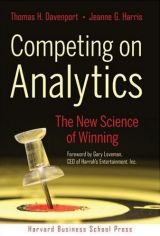


|
Competing on Analytics: The New Science of Winning (精装)
by Thomas H. Davenport, Jeanne G. Harris
| Category:
Competition, Strategy, Winning strategy, Game plan |
| Market price: ¥ 290.00
MSL price:
¥ 248.00
[ Shop incentives ]
|
| Stock:
Pre-order item, lead time 3-7 weeks upon payment [ COD term does not apply to pre-order items ] |
MSL rating:
 Good for Gifts Good for Gifts |
| MSL Pointer Review:
A well thought out, clearly communicated and detailed analysis of how companies will really compete in the future. |
| If you want us to help you with the right titles you're looking for, or to make reading recommendations based on your needs, please contact our consultants. |

|
| |
AllReviews |
1 Total 1 pages 5 items |
|
|
The Financial Times, USA
<2008-07-25 00:00>
... the traditional ways of seeking competitive advantage are redundant and... the future lies with the ability to analyse the very considerable volumes of data it amasses about itself. |
|
|
The Wall Street Journal, USA
<2008-07-25 00:00>
Competing on Analytics is hardly the last word on the matter, but it is a useful primer for a business field that seems likely only to grow in importance. |
|
|
The Wall Street Journal, USA
<2008-07-25 00:00>
Intuition is useful in business. But... it isn't enough. |
|
|
James Taylor (MSL quote) , USA
<2008-07-25 00:00>
Tom and Jeanne have written an excellent new book (building on a paper they wrote some time ago) about what they call "analytic competitors", that is to say companies that use their analytic prowess not just to enhance their operations but as their lead competitive differentiator. The book discusses a number of these analytic competitors and gives an overview of how analytics can be used in different areas of the business and how you can move up the analytic sophistication scale.
The book has two parts - one on the nature of analytical competition and one on building an analytic competency. The first describes an analytical competitor and how this approach can be used in both internal and external processes. The second lays out a roadmap for becoming an analytical competitor, how to manage analytical people, a quick overview of a business intelligence architecture and some predictions for the future.
They define an analytical competitor as an organization that uses analytics extensively and systematically to outthink and outexecute the competition. The analytics are in support of a strategic distinctive competency and they argue, persuasively, that without a distinctive capability you cannot be an analytic competitor.
The book outlines what they call four pillars of analytical competition- a distinctiive capability, enterprise-wide analytics, senior management commitment and large scale ambition. They lay out 5 stages of analytic competition from "analytically impaired" to "analytic competitor". The importance of experimentation is made clear and the book repeatedly emphasizes the need for companies and executives to be willing to run the business "by the numbers".
The book is full of stories about how companies compete analytically and this is one of the book's strengths. It also has a great list of questions to ask about a new initiative and outlines a number of ways to get a competitive advantage from your data. Regardless of the competitive approach, the need for analytical executives to be willing to act on the results of analyses is made clear. The book ends with a great list of changes coming.
This is a very interesting book both for those interested in competing on analytics and those interested simply in making more use of their data. |
|
|
From a guest reviewer, USA
<2008-07-25 00:00>
This book is incredibly useful, and some of the hard-core propellerheads who have criticized it for not being rigorous enough are missing the point. It is not intended to be a highly analytical proof of the value of any particular analytical technique. It's a clear, persuasive discussion of how to establish a broad analytical capability within a company, and some of the benefits that might accrue from having that capability. It shows that there is a correlation (no causation is argued) between being analytical, and being successful from a financial standpoint. I have used it to convince other managers in my company that we need to take a more analytical perspective on our business and industry. They have found it just as compelling as I did. The stories about the Red Sox (who seem to be doing pretty well again this year--surely in part because of their analytical orientation) and other sports teams only add to its appeal. |
|
|
|
1 Total 1 pages 5 items |
|
|
|
|
|
|